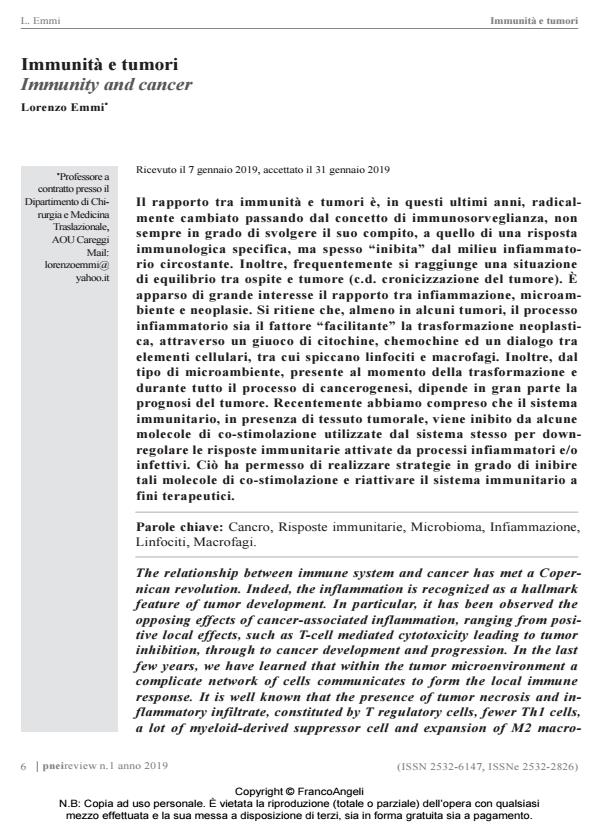Immunity and cancer
Journal title PNEI REVIEW
Author/s Lorenzo Emmi
Publishing Year 2019 Issue 2019/1
Language Italian Pages 9 P. 6-14 File size 1113 KB
DOI 10.3280/PNEI2019-001002
DOI is like a bar code for intellectual property: to have more infomation
click here
Below, you can see the article first page
If you want to buy this article in PDF format, you can do it, following the instructions to buy download credits

FrancoAngeli is member of Publishers International Linking Association, Inc (PILA), a not-for-profit association which run the CrossRef service enabling links to and from online scholarly content.
The relationship between immune system and cancer has met a Copernican revolution. Indeed, the inflammation is recognized as a hallmark feature of tumor development. In particular, it has been observed the opposing effects of cancer-associated inflammation, ranging from positive local effects, such as T-cell mediated cytotoxicity leading to tumor inhibition, through to cancer development and progression. In the last few years, we have learned that within the tumor microenvironment a complicate network of cells communicates to form the local immune response. It is well known that the presence of tumor necrosis and inflammatory infiltrate, constituted by T regulatory cells, fewer Th1 cells, a lot of myeloid-derived suppressor cell and expansion of M2 macrophages, promotes tumor growth and progression. The field of cancer immunotherapy has experienced alternating periods of success and failure in the development of cancer therapies. The current breakthrough in cancer immunotherapy results from the identification and subsequent targeting of checkpoint mechanisms in T cells with antibodies against CTLA-4, PD-1 and PD-L1. CTLA-4 and PD-1 are co-inhibitory receptors found on the cell surface of T cells.
Keywords: Cancer, Immune responses, Microbiome, Inflammation, Lymphocytes, Macrophages.
- Abbas A.K., Lichtman A.H. and Pillai S. (2015). Cellular and Molecular Immunology. Eight Edition. Philadelphia: Saunders (trad. it.: Immunologia cellulare e molecolare. Ottava edizione. Milano: Edra, 2015).
- Conlon K.C., Miljkovic M.D. and Waldmann T.A. (2019). Cytokines in the Treatment of Cancer. J. Interferon Cytokine Res., 39(1): 6-21.
- Diakos C.I., Charles K.A., McMillan D.C. and Clarke S.J. (2014). Cancer-related infl ammation and treatment effectiveness. Lancet Oncol., 15(11): e493-503. DOI: 10.1016/S1470-2045(14)70263-
- Mantovani A. (2018). The infl ammation - cancer connection. FEBS J., 285(4): 638-640.
- Van den Bulk J., Verdegaal E.M. and de Miranda N.F. (2018). Cancer immunotherapy: broadening the scope of targetable tumours. Open Biol., 8(6).
- Implementation of a medication education training program for student pharmacists employed within an academic medical center Kisha A Dunkley, Doneisha Evelyn, Veronica Timmons, Tara T Feller, in American Journal of Health-System Pharmacy /2020 pp.206
DOI: 10.1093/ajhp/zxz309
Lorenzo Emmi, Immunità e tumori in "PNEI REVIEW" 1/2019, pp 6-14, DOI: 10.3280/PNEI2019-001002